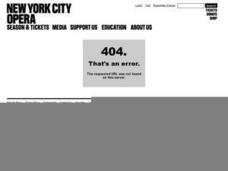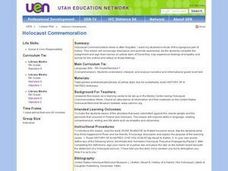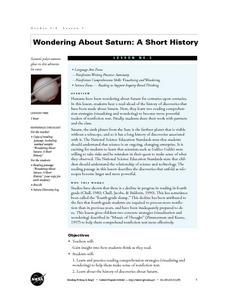Curated OER
Civil War Documents In Brooklyn
Students investigate the use of monuments and why they are important for the study of history. They conduct research using a collection of primary sources. Students write a report about the information they find and present it to the class.
Curated OER
Children of Loneliness: Immigration and Intergenerational Stories
Students evaluate Anzia Yezierska's story, "Children of Loneliness," in relation to Jewish immigrants coming to America. They discuss the connections in the story to their own coming to America and their roles as parents. After...
Curated OER
Primary Sources
Students write personal facts on a photograph of themselves to create a Primary Source. They then define Primary Source and list examples as a class of places where they could find primary sources. They also discuss the importance of...
Curated OER
Constrating Cinderellas/ Connecting LA Cenerentola
Students contrast the traditional Cinderella character with a modern, independent and socially conscious Cinderella. To activate prior knowledge by eliciting from the students some of the familiar story elements of the traditional...
Curated OER
"Open Mic" - Giving Creative Expression To The Connection Between The Japanese American Internment, September 11, And Our Rights Today
Students explore the similarities of the Japanese-American experience in WWII and Arab-American experience in post-September 11 US policy. They create presentations on their reflections and express themselves through poetry, dance,...
Curated OER
I Spy
Students examine a letter written by an Army officer from Delaware to the President (Governor) of Delaware during the American Revolution. Students compare the British and American Armies using Howard Pyle paintings.
Curated OER
Holocaust Commemoration
Fifth graders explore the history of the Holocaust during Holocaust Commemoration week. They complete activities that help them explore the feelings of empathy and sorrow for the victims. They complete the activities in a learning center.
Curated OER
"Christmas Comes to Moccasin Flat"
Students discuss the life of the author of "Christmas Comes to Moccasin Flat". They also discuss the piece of literature and what Christmas means to them. In groups, they discuss how the novel ends.
Curated OER
United States Colored Troops in Missouri: Finding African American History at the M
Students analyze primary source documents about African American soldiers in Missouri. They work together to complete a worksheet about the document. They discuss the information they gathered as a class.
Curated OER
Anasazi Basket Weaving: 0-500 A.D.
Sixth graders study Period 1- Basket Maker 0-500 A.D. of Anasazi Culture. They identify the sequence of history in Anasazi Culture and Indians of the Mesa Verde. They discover American Indian contributions to the world and develop...
Curated OER
Anasazi Pueblo Period: 700-1050 A.D.
Sixth graders study Period 3-Developmental Pueblo 700-1050 A.D., of Anasazi culture. They identify the sequence of history in Colorado and recognize American Indian Contributions to the world. They study Indians of the Mesa Verde and...
Curated OER
Hands
Students are read the book "Hands". They discuss things they are able to do with their hands. They create a cutout of their hands and write one thing they can do on the hand. They share what they wrote with the class.
Curated OER
Scanning Text
Students search for particular piece of information in text. They develop skills of looking for information and finding specific data without reading the whole text.
Curated OER
Cultural Lit. 26: Anasazi Pueblo: 1050 to 1300 A.D.
Sixth graders study Anasazi Culture through direct instruction and cooperative groups.
Curated OER
Anasazi Pueblo Period: 700-1050 A.D.
Sixth graders investigate the main ideas and information about the Developmental Pueblo period, from 700-1050 A.D., of the Anasazi.
Curated OER
Anasazi Basket Weaving: 500-700 A.D.
Sixth graders examine the main ideas and information about the Modified Basket Maker Period 500-700 A.D. of the Anasazi.
Curated OER
Wondering About Saturn: A Short History
Learners read an article about the history of Saturn. They complete reading comprehension tests. They examine what has been discovered on the planet.
Curated OER
Social Studies: Chinese Migration to America
Students examine human migrations and hypothesize why Chinese immigrants came to the Pacific Northwest. In groups, they research reasons for the migration and record them on a Venn Diagram with general migratory reasons. Students...
Curated OER
Exploration--Widening Our Horizons
Students examine the difficulties of exploration and some of the motivations for exploration. They investigate various types of explorers and identify the difficulties faced by the New World explorers. Students create a journal of...
Curated OER
Cell Division: The Cell Cycle and Mitosis
Learners will be able to identify the different stages of the eukaryotic cell cycle as well as the different stages of mitosis in the proper order. Students will also be able to recognize what organelles of the cell are integral to...
Curated OER
Celebrating Thanksgiving
First graders identify symbols associated with special days and give reasons for observing holidays. They compare families of long ago with todya and talk about the first Thanksgiving and how it is celebrated in modern times. For...
Curated OER
The Things We Do
Fourth graders conduct a literature study in order to investigate the concept of change and how it occurs in the environment. The teacher uses the method of concept development for investigation.
Curated OER
The Mayflower Compact Started It
Young scholars examine the role the Mayflower Compact had in aiding the common good. They analyze the importance of the Compact and what affect it had on the colony. They write a paper summarizing how they interpreted the Compact itself.
Curated OER
History or Mis-story?
Students explore some of our country's founding myths and legends by participating in an online poll. For example, did George Washington really chop down a cherry tree, then confess to his father about the deed, saying, I cannot tell a lie?

























